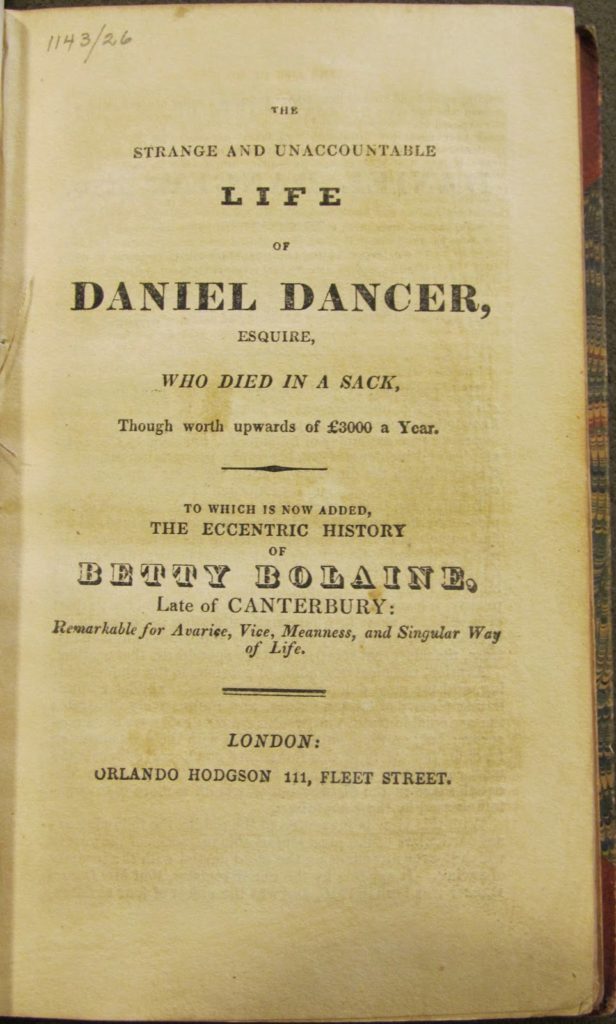One of the things I love about working at the Rosenbach is that I’m always discovering new and fascinating things in the collection. I was flipping through the card catalog, in search of a completely different book, when I saw a card for an item with the wonderful title, The Strange and Unaccountable Life of Daniel Dancer, Esquire, Who Died in a Sack, Though Worth Upward of £3000 a Year.
 |
| The Strange and Unaccountable Life of Daniel Dancer, Esquire. London: Orlando Hodgson, EL3 .A2p The Rosenbach of the Free Library of Philadelphia |
With a title like that I couldn’t resist; I had to know more. (I guess this kind of chance encounter is one of the side benefits of still having a card catalog.) The tale turns out to be about a wretched miser, who lives with his equally miserly sister. Here are a few choice excerpts, describing their penny-pinching lifestyle:
[T]hey, for a series of years, lived as sumptuously as three pounds of sticking of beef, and fourteen hard dumplings, would allow for the short space of seven days; and this supply, for years, served them week after week ; and though, during hot weather in summer, the meat might urge greater expedition, and fresher supplies, yet they never were observed to relinquish their daily portion, with one cold dumpling and a draught of water. Half a bullock’s head, with occasionally a few stale trotters, made broth for weeks; and this was sometimes rendered more savoury by the addition of a few picked bones which he took up in his walks, and of which he daily deprived the dogs.
It was during the last illness, which terminated his sister’s life, that he was importuned to afford her some medical assistance ; to which he shrewdly replied, it would cost him money ; and, besides, continued he, “Why should I waste my money in wickedly and wantonly trying to oppose the will of God ! If the girl is come to her latter end, nothing can save her; and all I may do, will only tend to make me lose my money; and she may as well die now as at any other time.”
For many years it was his opinion, that every man ought to be his own cobbler; and for this employ he had a lucky genius, which he indulged so far as to keep by him the most necessary tools for mending shoes; but these, it must be impartially observed, cost him nothing; for he had borrowed one at a time from different persons until he had possessed himself of a complete set of them, and with these he mended his own shoes so admirably, that what he wore, by the frequent jobs and coverings they had received from his thrifty hands, had become so ponderous, that running a race in them would have been impracticable; and, besides, their dimensions were so much enlarged, that they resembled hog-troughs more than shoes. To keep these on his feet, he took several yards of cords, which he twisted round his ankles in the manner the ancient Romans wore their sandals.
Though Mr. Dancer never indulged himself in the extravagant luxury of snuff-taking, yet he was always careful to solicit a pinch or two from those who did; but it was not to gratify his own nose — no such thing! it was to lay it by in a box, which he carried about him for that purpose ; and when full,he would barter its contents at a neighbouring chandler’s-shop for farthing candles, which he made to last him till he had replenished his box again. Mr. Dancer never suffered any light in his house, except what issued from the glimmer of the fire, unless while he was going to bed.
True to the title, the text does describe how he “died in in a sack”:
During the illness which terminated this miserable man’s mispent life … Lady Tempest accidentally called on him, and found him laying in an old sack, which came up to his chin, and his head wrapped in pieces of the same materials as big as a bee-hive. On her remonstrating against the impropriety of such a situation, he observed, that being a very poor man, he could not afford better; and having come into the world without a shirt, he was determined to go out in the same manner. As he brought nothing with him, he did not think he had any right to carry any thing away ; and the less he made use of he thought was the more acceptable to God: so that in his last moments, he made his saving notions square with his most serious thoughts.
After his death, the Lady Tempest and her husband (Dancer’s heirs) found untold riches hidden inside dung heaps in the cow barn, nailed inside the manger, and stuffed inside the furniture.
The moral of this story is hardly subtle, but the author lays it out even more clearly:
Mr. Dancer was the most perfect picture of human penury that perhaps ever existed, and the most singular character that ever lived; his habits were those of an hermit; and his extreme avarice rendered him as abstemious as any ascetic of the desert in this manner lived, and in this situation died, Daniel Dancer, Esquire, a monumental proof to the world, that the advantages of fortune, unless properly directed, will not make their possessor happy.
It turns out that Dancer was a real historical figure, who was born in 1716 and died in 1794 (as the pamphlet claims). His renown was such that chapbooks began to be published about him three years after his death and the story remained popular through the 19th century. If he sounds rather Scrooge-like, there may be a reason–some say that Dancer was an inspiration for Dickens’s Ebenezer Scrooge. Dickens was certainly familiar with Dancer’s story; in Our Mutual Friend, the character of Nicodemus Boffin (who is pretending to be a miser) refers to the story several times and has it read aloud.
Last year the Headstone Manor Museum collaborated on an exhibition entitled Daniel Dancer: Harrow’s Miser Next Door . You can also find records of a court case involving Daniel Dancer in the online records of the Old Bailey. In 1788 he accused a John Dancer (a relative?) of having stolen cash, a silver tankard, and some small items from him. John Dancer was found guilty and sentenced to death.
See where a random catalog card can lead you! That’s why I love the Rosenbach.

Kathy Haas is the Associate Curator at The Rosenbach of the Free Library of Philadelphia and the primary poster at the Rosen-blog.
